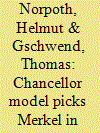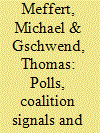| Srl | Item |
| 1 |
ID:
126327


|
|
|
|
|
| Publication |
2013.
|
| Summary/Abstract |
In the German national election this fall, based on the forecast of the Chancellor Model, the governing coalition will score a resounding victory. Chancellor Angela Merkel enjoys a high approval rating, which puts her at a 2-1 advantage over the challenger, Peer Steinbrück. Although Germany is not a presidential system, where voters elect the chief policymaker, chancellor support has proved to be a strong predictor of vote choice in German national elections. Our forecast model also includes long-term partisanship, which provides a broad base for the governing parties in this election, and length of tenure, which exacts a modest penalty after two terms of office. Since its premiere in 2002, the model has predicted the winner in each election. In a case of perhaps beginner's luck, the 2002 forecast scored a bull's-eye with 47.1%, the exact share of the governing parties; the forecast was posted three months before Election Day. No poll or other model, not even the Election-Day exit polls, came close to this performance; in fact, most people predicted a defeat for Schröder's red-green coalition (Norpoth and Gschwend 2003).
|
|
|
|
|
|
|
|
|
|
|
|
|
|
|
|
| 2 |
ID:
105706


|
|
|
|
|
| Publication |
2011.
|
| Summary/Abstract |
Polls and coalition signals can help strategic voters in multiparty systems with proportional representation and coalition governments to optimise their vote decision. Using a laboratory experiment embedded in two real election campaigns, this study focuses on voters' attention to and perception of polls and coalition signals. The manipulation of polls and coalition signals allows a causal test of their influence on strategic voting in a realistic environment. The findings suggest that active information acquisition to form fairly accurate perceptions of election outcomes can compensate for the advantage of high political sophistication. The theory of strategic voting is supported by the evidence, but only for a small number of voters. Most insincere vote decisions are explained by other factors. Thus, the common practice to consider all insincere voters as strategic is misleading.
|
|
|
|
|
|
|
|
|
|
|
|
|
|
|
|